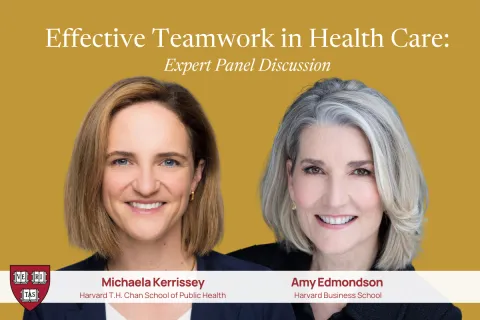Best Online Courses for Health Care Professionals
Originally Published March 22, 2023
Updated June 4, 2025
Series mentioned in this post: Health Care Leadership
Every day the health care industry evolves and makes significant advancements with the introduction of new technologies, systems, and ways of working within an organization. As a health care professional, you understand the importance of staying informed and ahead of these changes.
The best way to keep pace with the industry is to actively pursue professional development opportunities that will help you provide the best possible care and services to the patients and communities within your scope of work.
The good news is, whether you are a nurse, physician, administrator, or executive, there are a wide variety of online health care courses available that can help you achieve your professional and organizational goals.
In order to help you take the next step in your professional development, we have compiled a list of our top professional development courses for health care professionals:
10. Reducing Racial Disparities in Health Care
How does your organization address racial equity and access to health care?
Offered in conjunction with the Disparities Solutions Center at Massachusetts General Hospital (MGH), this five-week course will use real-world examples, case studies, and insights from leaders in the field to help you digest the latest in understanding racial disparities in health care—allowing you to create strategic approaches that you can apply to your organization.
9. Bioethics: The Law, Medicine, and Ethics of Reproductive Technologies and Genetics
Do you work in the reproductive or genetics field of medicine? Do you want to understand the legal implications surrounding reproduction and human genetics?
This law course includes interviews with individuals who have used surrogacy and sperm donation, with medical professionals who are experts in current reproductive technologies like In Vitro Fertilization and Preimplantation Genetic Diagnosis, and bioethicists and journalists who study the ownership and use of genetic information within human tissue. Additional Harvard colleagues will also share with you their thoughts on topics such as disability law as it relates to reproductive technology.
8. Global Health Case Studies from a Biosocial Perspective
How can your work impact health on a global scale?
This introductory global health course aims to frame global health's collection of problems and actions within a particular biosocial perspective. It develops a toolkit of interdisciplinary analytical approaches and uses them to examine historical and contemporary global health initiatives with careful attention to a critical sociology of knowledge.
7. Prescription Drug Regulation, Cost, and Access
Do you work in pharmaceuticals and want a better understanding of how prescription drugs make their way to the pharmacy’s shelves?
This course investigates the major issues affecting the regulatory approval and evidence-based use of prescription drugs. You will learn the rules and regulations governing the pricing, marketing, and safety monitoring of approved prescription drugs and the importance of the FDA in regulating key aspects of the pharmaceutical market.
6. Digital Health
Want to learn how to help your health care organization adopt new digital softwares and products?
Join Stanley Y. Shaw, MD, PhD, Associate Dean for Executive Education at Harvard Medical School, to learn about the opportunities and difficulties facing widespread adoption of digital technologies in healthcare. In this four-week course, you’ll explore innovative frameworks that will help you think strategically about adopting and implementing digital transformation in your organization.
5. Strengthening Community Health Worker Programs
How can you help impact the health of remote communities?
This course, developed in collaboration with the Community Health Academy at Last Mile Health, introduces learners to the core concepts of community health worker programs, and explores what is needed to build and strengthen large-scale programs in order to improve access to high-quality health services.
4. Health Care Strategy
Why is a strategic vision important to health care organizations?
Led by Harvard Business School professor Leemore Dafny, this five-week course will help you align the principles of business strategy with the unique challenges and structures of U.S. health care organizations. The course will enable you to define the mission of your organization, develop a strategy to create and capture value, and lead your organization to success with confidence.
3. The Health Effects of Climate Change
Have you ever wondered how climate change might be affecting your patients’ health?
By looking at air quality, nutrition, infectious diseases, and human migration, this course will show you how increases in greenhouse gases impact public health. Experts working in a variety of settings will present their recommendations for responding to these challenges, and interested students will have the opportunity to learn about the research methods that measure the health effects of climate change.
2. Health Care Economics
What are the primary drivers of rising health care costs? How does money shape your decision-making as a provider or a payer?
Even for those within the health care industry, the economics of the United States health care system are stunningly complex and can be challenging to navigate. Join Michael Chernew, PhD in this six-week course to gain insights into the interactions between industries in the health care sector and learn what economic forces are shaping health care.
1. Innovations in Teamwork for Health Care
How do you strengthen flexibility and collaboration even as team structures fluctuate across departments?
In this course, experts from Harvard Business School and the T.H. Chan School of Public Health, Amy Edmondson and Michaela Kerrissey, teach learners to implement a strategy for organizational teamwork in health care.
LEARN MORE
Learnings from our health care courses have the biggest impact when applied by teams. Learn about our offerings for teams and organizations.
Related ArticlesEffective Teamwork in Health Care: Expert Panel Discussion Image

Image

|